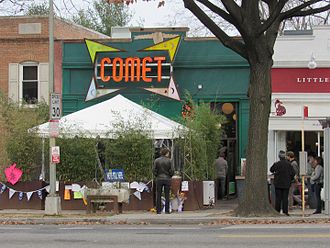تئوری توطئه پیتزاگیت

پیتزاگیت (به انگلیسی: Pizzagate) یک تئوری توطئه است که در طول چرخه انتخابات ریاست جمهوری ایالات متحده در سال ۲۰۱۶ منتشر شد.[۱][۲][۳] این نظریه بهطور گسترده توسط طیف گستردهای از سازمانها، از جمله پلیس واشینگتن، دی.سی. رد شدهاست.[۲][۳][۴]
در مارس ۲۰۱۶، حساب ایمیل شخصی جان پدستا، رئیس ستاد انتخاباتی هیلاری کلینتون، در یک حملهٔ فیشینگ هک شد. ویکیلیکس ایمیلهای او را در نوامبر ۲۰۱۶ منتشر کرد. طرفداران تئوری توطئهٔ پیتزاگیت به اشتباه ادعا کردند که این ایمیلها حاوی پیامهای رمزگذاری شدهاست که چندین مقام بلندپایهٔ حزب دموکرات و رستورانهای ایالات متحده را با یک حلقهٔ قاچاق انسان و ارتباط جنسی کودکان مرتبط میکند. یکی از مؤسساتی که گفته میشود درگیر بوده، پیتزافروشی Comet Ping Pong در واشینگتن، دی.سی. بود.[۵][۶]
اعضای راست آلترناتیو، روزنامهنگاران محافظهکار، و دیگرانی که خواستار پیگرد قانونی کلینتون بهخاطر ایمیلها بودند، نظریهٔ توطئه را در رسانههای اجتماعی مانند ۴چن، 8chan و توییتر منتشر کردند.[۷] در پاسخ، مردی از کارولینای شمالی برای بررسی توطئه به پیتزافروشی پینگ پنگ سفر کرد و با شلیک تفنگ در داخل رستوران، قفل در یک اتاق انبار را حین جستوجوی خود شکست.[۸] صاحب رستوران و کارکنان نیز از سوی نظریهپردازان توطئه تهدید به مرگ شدند.[۹]
منابع
[ویرایش]- ↑ Huang, Gregor Aisch, Jon; Kang, Cecilia (December 10, 2016). "Dissecting the #PizzaGate Conspiracy Theories". The New York Times. Archived from the original on December 10, 2016. Retrieved December 10, 2016.
- ↑ ۲٫۰ ۲٫۱ Gillin, Joshua (December 6, 2016). "How Pizzagate went from fake news to a real problem". PolitiFact. Archived from the original on December 6, 2016. Retrieved December 6, 2016.
- ↑ ۳٫۰ ۳٫۱ LaCapria, Kim (November 21, 2016). "A detailed conspiracy theory known as "Pizzagate" holds that a pedophile ring is operating out of a Clinton-linked pizzeria called Comet Ping Pong". Snopes. Archived from the original on 2021-12-25.
- ↑ Alam, Hannah (December 5, 2016). "Conspiracy peddlers continue pushing debunked 'pizzagate' tale". Miami Herald. Archived from the original on December 7, 2016. Retrieved December 7, 2016.
One might think that police calling the motive a 'fictitious conspiracy theory' would put an end to the claim that inspired a gunman from North Carolina to attack a family pizzeria in Washington over the weekend
- ↑ Shalby, Colleen (May 24, 2017). "How Seth Rich's death became an Internet conspiracy theory". Los Angeles Times. Archived from the original on May 29, 2017.
Despite police statements and Rich's family concluding that his death was the result of an attempted robbery, the rumor spread within the same circles that churned out the bogus 'PizzaGate' story
- ↑ Farhi, Paul (May 17, 2017). "A conspiratorial tale of murder, with Fox News at the center". The Washington Post. Archived from the original on May 18, 2017. Retrieved May 18, 2017.
The Rich story has taken on elements of the Comet Ping Pong conspiracy, a false and preposterous tale involving Hillary Clinton and her supposed operation of a child-abuse ring at a District pizza restaurant.
- ↑ Wendling, Mike (December 2, 2016). "The saga of 'Pizzagate': The fake story that shows how conspiracy theories spread". BBC News. Archived from the original on December 2, 2016. Retrieved December 2, 2016.
- ↑ Kang, Cecilia; Goldman, Adam (December 5, 2016). "In Washington Pizzeria Attack, Fake News Brought Real Guns". The New York Times. Archived from the original on February 27, 2017.
- ↑ Kang, Cecilia (November 21, 2016). "Fake News Onslaught Targets Pizzeria as Nest of Child-Trafficking". The New York Times. Archived from the original on December 8, 2016.
